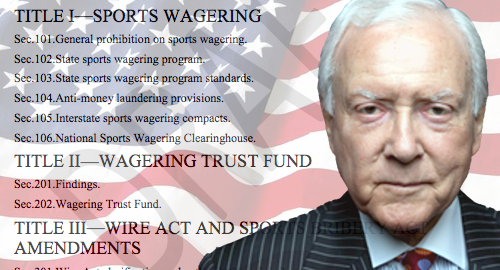 A draft of a new US federal sports betting bill would allow the US Attorney General to potentially veto state-level legislation, while also requiring bookmakers to use official league-supplied data for wagering purposes.
A draft of a new US federal sports betting bill would allow the US Attorney General to potentially veto state-level legislation, while also requiring bookmakers to use official league-supplied data for wagering purposes.
The new draft legislation, first spotted by ESPN scribe David Purdum, is the first significant effort to reinstate some level of federal control over betting since the US Supreme Court struck down the federal betting prohibition this spring.
Purdum reported that the bill had emerged from the office of Senator Orrin Hatch (R-UT), who is set to retire after the current lame duck session of Congress. Hatch (pictured) has previously secured the public support of Rep. Chuck Schumer (D-NY), while Rep. Jim Sensenbrenner (R-WI) recently promised a “legislative response” to the federal betting disempowerment was in the works.
With Hatch set to exit the political scene when the lame duck session concludes, he may not have the clout with which to push through something as controversial as a betting bill. Some Republicans may also find the bill an uncomfortable reminder of the states’ rights issues that brought about the demise of the previous federal betting bill. But for argument’s sake, read on…
NONE SHALL PASS
The draft bill’s most striking element is the requirement for all state-level sports betting legislation to be submitted to the US Attorney General for approval. The AG would have 180 days in which to mull things over, and could veto any legislation that didn’t meet minimum standards. Even if the AG okays a bill, the state would have to apply for its renewal every three years.
It’s unclear from the draft whether this inspection would apply retroactively to states that had already approved their regulated betting markets prior to the new federal bill’s passage. Seven states have already launched legal wagering markets in the six months since the Supreme Court decision.
DATA IN, DATA OUT
State-licensed betting operators would be required to use official league-supplied data for wagering purposes, at least until December 31, 2022. After that date, an operator could potentially use “legally obtained” data that offers “substantially similar speed, accuracy, and consistency” to that of the league-supplied product.
Operators would also be required to provide anonymized sports betting information to a nonprofit ‘national sports wagering clearinghouse,’ a central registry for ensuring no country-wide suspicious betting patterns emerge. The info is to be submitted “in real time or as soon as practicable, but not later than 24 hours after” a wager is placed with the operator.
Operators would also have to file suspicious transaction reports to the national clearinghouse and cooperate with any subsequent state or federal investigations of these transactions. The clearinghouse would also control a national register of excluded bettors, be they self-excluded or barred from betting because of some sketchy behavior.
The 0.25% cut of wagering handle that the federal government currently claims via excise tax would now be folded into a ‘wagering trust fund.’ This fund would be used for running the clearinghouse and other wagering-related programs.
WIRE ACT BE DAMNED
The draft would amend the 1961 Wire Act – which bans the transmission of wagering info over state lines – to permit operators to ‘lay off’ wagers with books in other states. This would be done by allowing interstate sports wagering compacts with other states and Indian tribes involved in gaming in those states. These compacts would also be subject to the AG’s approval.
BAD HOMBRES
The draft also takes aim at internationally licensed online sportsbooks that compete with state-licensed operators by targeting registrants of “nondomestic domain name[s] used by an internet site dedicated to unlicensed sports wagering” and any “owner or operator of an internet site dedicated to unlicensed sports wagering accessed through a nondomestic domain name.”
Payment processors would be required to prohibit transactions between unauthorized betting sites and US residents, while websites would be forbidden from accepting advertising promoting unauthorized sites.
The draft also includes a version of the infamous ‘bad actor’ clause, which in this case, would prohibit states from licensing any betting operator who accepted wagers from US residents after the 2006 passage of the Unlawful Internet Gambling Enforcement Act.
There’s even a clause that suggests international operators could be targeted for enforcement action if they offer “unlicensed sports wagering on sporting events that take place in the United States,” which appears to bar any international operator from taking wagers on US sports from anyone, not just US residents. The US really does put the ‘extra’ in extraterritorial jurisdiction, don’t they?